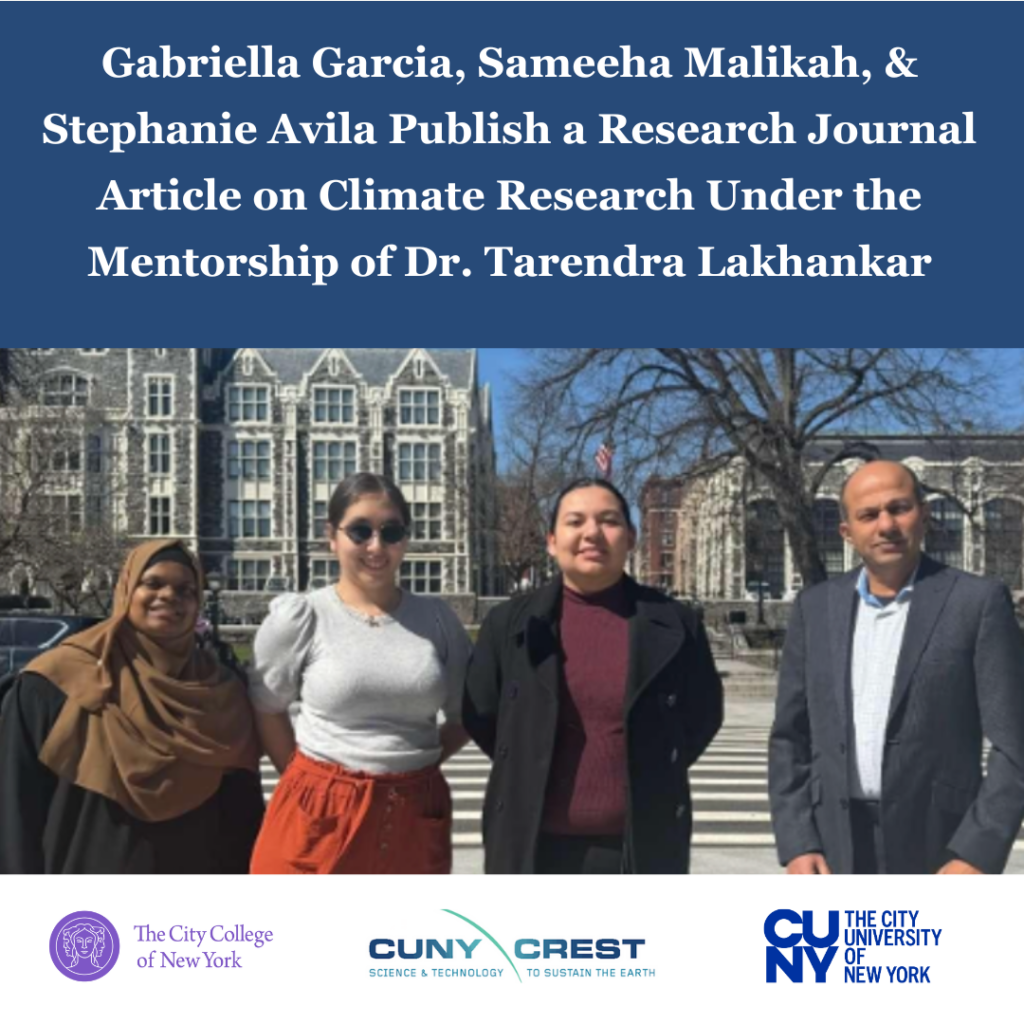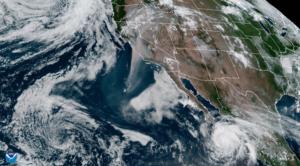Gabriella Garcia, Sameeha Malikah, & Stephanie Avila published a research article titled Historical Climate Trends and Extreme Weather Events in the Tri-State Area: A Detailed Analysis of Urban and Suburban Differences in the Climate journal by Multidisciplinary Digital Publishing Institute (MDPI) issued in February 2024.. They conducted the research under the mentorship of CUNY CREST Research Scientist, Dr. Tarendra Lakhankar. Gabriella is currently pursuing her B.S. in Earth and Atmospheric Sciences/B.S. in Science Learning and Public Engagement at the City College of New York (CCNY) and formerly participated in the CUNY High School Initiative in Remote Sensing of the Earth Systems Engineering and Sciences (HIRES 2020) and CUNY Summer Bridge Program (2022). Sameeha and Stephanie are currently pursuing their B.S. in Earth Systems Science and Environmental Engineering at CCNY. Sameeha formerly participated in the CUNY Summer Bridge program through National Science Foundation Research Experience for Undergraduates (NSF REU 2022) and Stephanie Avila served as NOAA Center for Earth System Sciences and Remote Sensing Technologies (CESSRST) I Fellow as well attended the CUNY Summer Bridge Program (2021).
Elated on this achievement, students expressed their thoughts. Gabriella said, “I’m extremely proud to have worked with a team who cares about the advancement of science and of people. Our work is just a glimpse into our passion and I’m sure that our contribution will lead to bigger findings and lasting change.” Sameeha said, “This publication journey has taught me a lot about python, ArcGIS, and academic writing. Most importantly, it taught me to persevere and be patient with hurdles that may come up, a valuable lesson that will help me in my career. Thanks to Dr. Lakhankar for his continuous support, and Stephanie and Gabriella for being awesome!” Stephanie said, “Progress is not always linear. As long as you keep pushing yourself forward, you can achieve great things.’ Dr. Lakhankar added, “I am immensely proud of these undergraduate students. Their publication reflects their commitment to environmental issues and showcases the high-quality research conducted at CCNY.”
The purpose of this article is to relay the impacts of climate change over time on temperature and precipitation trends in the tri-state area of New York, New Jersey, and Connecticut through the analysis of seasonal, annual, and spatial trends in temperature and precipitation. Read the article here.
Students commented on their motivation to conduct this research and publish it. Gabriella said, “I was looking for my footing in the world of research and Dr. Lakhankar gave me the opportunity, first with the research project then with the completion of the paper. Initially, this was my main motivation. But as we neared completion, Dr. Lakhankar suggested we publish our findings. To me, that is when the significance of what we were doing really sank in. The paper presented other complex tasks to overcome but I wanted to see it published to both further scientific efforts in understanding extreme weather and to contribute to open-access efforts.” Sameeha said, “After we completed the summer, our mentor, Dr. Lakhankar, motivated us to work on writing a paper based on the research we’ve done. We went along with his advice as a team to contribute our findings to the greater science world. As an undergraduate, I also wanted to learn about the process behind publications.” Stephanie said, “I was motivated to conduct this research and publish the paper due to my interest in climate change and its impact on New York and the Tri-State region. We also received a lot of support and encouragement from Dr. Lakhankar, who played a big part in helping the team publish the research paper.”
This journey had its challenges but the students overcame those with their persistence, hard-work, and support from Dr. Lakhankar. Students said, “Due to the workload of our classes, our progress on the research was very inconsistent for some time. We were able to set aside the time to work hard and make up for that time with the encouragement of Dr. Lakhankar and thus, able to submit the manuscript.”
Formerly being part of programs such as CUNY HIRES, CUNY Summer Bridge, CESSRST I, students have gained crucial technical skills and valuable research experience. Gabriella said, “I began doing research as a HIRES intern two years before I became a Summer Bridge student. All of the skills that helped me as a Summer Bridge student and beyond, I first learned with the HIRES program. HIRES was my introduction to a lot of core research skills that I did not have: coding, data processing, introduction to multiple maps making tools like ArcMap and ArcGIS, and how to present that information on a poster. Summer Bridge gave me a great opportunity to continue to build on all these skills and more on a more intricate research project. For the paper, this was an excellent introduction to publishing; there were so many nuances that I was unaware of and I was very glad to be under Dr. Lakhankar’s guidance throughout the several steps towards publishing. One of the biggest advantages was understanding the importance of being detailed with the paper since it will be used in the future by people seeking to understand historical weather trends and extreme weather patterns.” Sameeha said, “Through the NSF REU program, I participated in the Summer Bridge program. The ArcGIS and python workshops helped me refresh the skills I needed for our project. There were also workshops throughout the program to help us develop collaboration skills which were fun and helpful in getting to know my team members better.” Stephanie said, “CCNY, CREST, Summer Bridge, and CUNY HIRES united the team and provided many technical and educational resources in the form of workshops. We were also given the opportunity to present our research at the summer symposium and other conferences, which helped to hone our communication and presentation skills.”
Students value their mentor, Dr. Lakhankar’s contribution to their journey. Expressing gratitude, Sameeha said, “Dr. Lakhankar’s patience with us and persistent support has made this publication possible. At times when we would put a pause on working on the paper due to heavy coursework, he patiently worked with us and was available to support us when we were ready to continue.”
CREST congratulates Gabriella Garcia, Sameeha Malikah, Stephanie Avila and Dr. Tarendra Lakhankar on this achievement!


